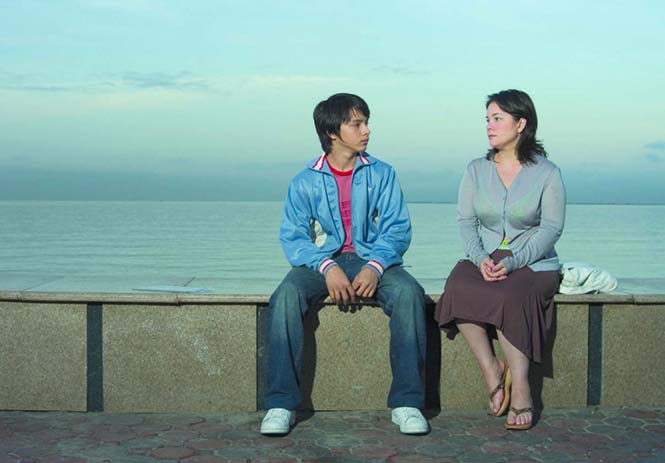This is part of FRINGE MAGAZINE’s coverage of Cinemalaya 2018. Themed “Wings of Vision”, the 14th iteration of the annual indie film fest is said to continue to “discover, encourage and support the cinematic works of upcoming and veteran Filipino filmmakers who boldly articulate and freely interpret the Philippine experience with fresh insight and artistic integrity.” So here’s a closer look at whether the films do exactly that.
Glaiza de Castro (Pirena in GMA Network’s 2016 revival of Encantadia) has extremely well-done eyebrows. That should serve as a compliment; but – in the case of Kip Oebanda’s Liway – it shouldn’t. Instead, her eyebrows are too well-done so that – for me – they’re taking away from the story and storytelling.
Let me tell you why…
THE STORY
Liway (roughly based on a true story) tells the story of a family – including Day, her husband Ric, and their son Dakip (the other sons Eric and Malaya were there but not there) – inside Camp Delgado, a makeshift prison inside a military camp for both rebels and criminals during Martial Law. Day – as is expected from any parent – wants to shield her child from life’s harsh realities. To do this, she tells stories about an enchantress named Liway. Just before the Marcoses flew to Hawaii, their lives became increasingly difficult, so the husband and wife were confronted with the possibility that they may have to give up their children (again) or even die.
THE GOOD
- That this flick is based on a true story that happened in Negros tops this list. For the longest time, the telling of the effects of the Martial Law has been largely limited to Metro Manila. That Liway tells how Martial Law was also felt in the Visayas is – in one word – refreshing. Because State abuses then, just as they continue to do now, affect the whole country.
- It gave us glimpses of truths, no matter how hard these truths may be to swallow – e.g. what those jailed had to give up to survive, many of those who helped Marcos run the country are still out there and even thrived after he left (FVR became president, Enrile is still laughing at all of us, and yes, the Marcoses are back in power).
- It highlighted that storytelling matters – e.g. our folklore; our history; our songs; and in this case, our films…
THE NOT SO GOOD
- If you feel Argo manipulated you (with the creation of the fake rush to the airport, et cetera), this would feel like that, too (with the “pending” doom/death hanging over the prisoners’ heads). Films, in a way, manipulate; but when that manipulation is too blatant, it then becomes – borrowing Glaiza’s word in the film (though this isn’t hers, of course) – “propaganda”.
- The attempt to be akin to Guillermo del Torro’s Pan’s Labyrinth’s fantastical telling was half-baked. There, the fantasy “covered up” the harshness of the war; here, where Liway’s story was supposed to also do the same, it started out nice, and then just became a distraction. It was, in a word, inconsequential.
- The abovementioned (#2) may be because of the director’s penchant to be like Hollywood to “lay everything down on the table”. The exposition had to be “stated”, instead of the audience discovering this for themselves.
- Technical issues were hard to ignore – e.g. the kids were playing hide and seek at the start of the film, and then… the playmates just disappeared; considering that she was already living in the mountains for years and then was in jail for years after that, she still had those perfectly well-done eyebrows; et cetera.
- “Errors” in the narrative flow – e.g. when Day agreed to tell Liway’s story, Dakip just automatically turned on a flashlight for hand shadow puppets (He knew it was going to be a puppet show? How convenient!); and when Dakip stepped on a nuno (gnome’s nest), the conversation was (Duh!) going to lead to a talk about the enchantress Liway.
- Life in the “mountains” – even if “dramatized” as an integral part of Liway’s life – was not well developed, e.g. the number of rebels, and the outfit while there.
IN THE END
But in the end, perhaps particularly considering that this is Oebanda’s “tribute” to his mom, basing it on her true story, the story suffices. As long as you can get past Glaiza de Castro’s extremely well-done eyebrows (LOL).
RUNNING TIME: 100 MIN.
STARRING: Glaiza de Castro, Dominic Roco, Kenken Nuyad, Sue Prado, Soliman Cruz, Joel Saracho, Sue Prado, Paolo O’Hara, Ebong Joson, Nico Antonio, Gerry Cornejo, Diana Alferez, Julie Bautista, Pau Benitez, Liway Gabo, She Maala, Renante Bustamante & Madeleine Nicolas
PRODUCTION:
Director Kip Oebanda • Screenplay Kip Oebanda & Zig Dulay • Editor Chuck Gutierrez • Cinematography Pong Ignacio • Production Design Aped Santos, PDGP • Original Music Nhick Pacis • Sound Design Wildsound • Line Producer Jed Medrano • Producer Alemberg Ang • Production Manager Lucky Jay De Guzman





























































































